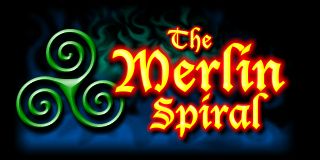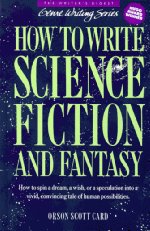Orson Scott Card’s “How To Write Science Fiction and Fantasy” — A Review
I just finished Orson Scott Card’s “How To Write Science Fiction and Fantasy“, and learned a lot.
One of the most helpful bits of advice was “Make sure you end the story that you begin”. Before I can explain this, you have to understand the four different types of stories:
Milieu – The story is the world, and it begins with someone entering the world, and ends when they leave it.
Idea – The story begins with a question and ends when the question is answered.
Character – The story is about the transformation of a character. Begins with their inner issues, and ends with them resolved in some way.
Event – Some event happens at the beginning that throws everything off, and the story ends when “normalcy” is restored.
So, if you begin a “character based story”, then don’t end the novel when an “event” is finished … you need to finish that emotional arc until the character based story will satisfy the reader.
For my own novel, Merlin’s Blade, I realized that I have mixed a character story with an event story. So did I end at the right place? In analyzing it, I have concluded that yes, I did. Since I begin with both stories, the ending must satisfy both, and it does.
Whew! I don’t have to rewrite! ![]()
So with the first novel in safe territory, what about my second novel (which I have written two scenes for)?

Orson’s writing advice really helped me here because I realized that even though I know a LOT about this story’s plot, I didn’t have a clue what kind of story it was. But now I do … it will be an intertwined character story: Merlin’s and Morgana’s, and how each must face themselves and come to a decision by the end of the book.
This is not to say that this will be some literary-self-angst-nothing-going-on book. It will have LOTS of action, suspense, and tension. Oh, and did I say ACTION?
But now I know the key that will signal the end of the book, the transformation that must take place to satisfy the reader and set up the next four books in the series.
I had recently decided to call this book “Merlin The Fool”, but with my new understanding of the journey that Merlin and Morgana must each take, I will call it “Merlin’s Shadow“.
Make sure to add Orson Scott Card’s “How To Write Science Fiction and Fantasy” to your reading list!


Great post, Robert. Very helpful. I found this book useful as well. I think OSC’s “Characters and Viewpoint” is even better, and really goes into the story types in more depth.
Your summary is excellent, however. No surprise there.
I had the opportunity to hear OSC riff on this subject for hours at his Writing Class and it was so helpful.
Thanks for posting, Robert! Thanks for your attention to your craft and for your willingness to share with other writers hoping to learn.
Somebody publish this guy.
That’s interesting. Looking over those categories, I don’t see one that describes my book. My book is about preventing something terrible from happening. But events throw off normalcy along the way, so I suppose it would best fit under the “Event Category.” In fact, now that I think about it, it fits in that category almost perfectly except for the fact that instead of there being one major event at the beginning that throws off normalcy, it’s a series of events that point toward an end that must be prevented.
Sam,
Thanks for the plug for OSC’s Characters and Viewpoint. I’ve read other books on that subject and wasn’t sure if I should go for it, but I think I will now.
Was Orson Scott Card writing class at a conference, or does he hold his own somewhere?
I also hope that I didn’t share too much from his book. I like to give a small sample to show the quality of the contents and what helped me—but my ultimate goal is to encourage people to buy the book.
Jacob (Yodeler),
I think your assessment of your novel is correct.
The imminence of a catastrophe is an “event” in and of itself, and a GOOD one to have in a book. It gets the CLOCK TICKING and propels the reader right to the end to find out what happens!
Thanks both of you for stopping by!
-Robert
I don’t think you shared too much. That was a good summary. OSC would be proud, I’m sure.
He does a writing class/bootcamp every year. It seems like every other year it’s at Southern Virginia University (as it is again this year). That is a Mormon Liberal Arts school where OSC is a Writer in Residence/Prof type.
Here’s the linkage.
http://www.hatrack.com/misc/bootcamp2009/index.shtml
I loved it, learned so much. I just did the two days though, would love to do the bootcamp. I’m sure it’s worth every penny.
Hi Robert. Good review. I too really enjoyed this book and like SD Smith, also have enjoyed Card’s “Character’s and Viewpoint” book.
Two other good writing books I’ve read have been Stephen King’s “On Writing,” and John Gardner’s “The Art of Fiction”
I enjoyed this book too when I read it a couple years ago. Card deftly takes the reader through his process from world-building to writing and character development – it’s a must have for every fantasy/sci-fi writer. I loved this book. I haven’t read the “Character & Viewpoint” book though, I may have to check that out. : )